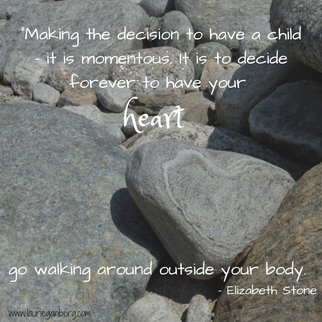 There are a lot of surprises when it comes to babies: how much noise tiny newborns can make; the volume of laundry; how many thousands of photos of a sleeping baby can end up on your phone/camera. But I hear from a lot of new mothers that they are taken aback by the anxious thoughts. And then they start worrying about how much they're worrying. It's a tough, but easy, spiral to fall into. Any of this sound familiar?
 Here are three strategies to help get you out of your head:
However, if strategies like these aren't cutting it; if you're having panic attacks; if the constant stream of thoughts in your head is keeping you awake even while the baby's asleep; if you're avoiding activities like bath time or not going particular places because of fear, you might need some extra support to feel better. Between 10-15% of women in the postpartum period will experience depression or anxiety. That's nearly 1 in 6. In my experience with new moms, the symptoms of anxiety are some of the most common. So here's what I want to make sure you hear: It's not your fault - it's not because of anything you did or didn't do. You are a good mother. And the even better news? You can feel like yourself again. How? First off, if the thought of "doing" anything else feels overwhelming right now, enlist help. Your partner, a friend, a family member can take care of the logistics. Unsure how to ask for help? Email them this post. If a new mother sent this to you, tell her you love her, she's a good mother, and you will help her with these next steps.
Have you made it to the other side of postpartum anxiety? What helped you? Please share in the comments. "Stone Heart" (http://bit.ly/1onQYe5) by Irene Grassi is licensed under CC BY-SA 2.0. Comments are closed.
|
Therapy, Groups, Supervision, Consultation, Training in Seattle, WA and online in Washington state
Laurie Ganberg, LICSW, PMH-C (#LW60673320) ~ Specializing in Perinatal Mental Health, Trauma, & Fat Liberation
Now practicing through Fiddlehead Therapy, PLLC with online services and in person in Mountlake Terrace, WA
Home | Privacy | Contact | Zoom Link
© 2019-2024 All rights reserved
Laurie Ganberg, LICSW, PMH-C (#LW60673320) ~ Specializing in Perinatal Mental Health, Trauma, & Fat Liberation
Now practicing through Fiddlehead Therapy, PLLC with online services and in person in Mountlake Terrace, WA
Home | Privacy | Contact | Zoom Link
© 2019-2024 All rights reserved
